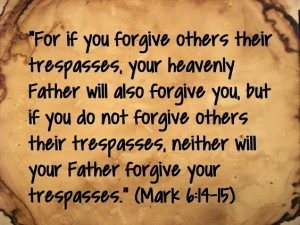 This is the eighth of a series of posts reflecting line-by-line on the Anima Christi. Suffer me not to be separated from Thee.
This is the eighth of a series of posts reflecting line-by-line on the Anima Christi. Suffer me not to be separated from Thee.
I have a chronic illness which is exacerbated by the foods I eat. Instead of traditional medicine, the only way this disorder can be treated is by eliminating certain foods from my life. At one particular visit, my doctor proposed an initial very strict stage of food elimination. Being used to elimination diets, , I didn’t give it a second thought. But, at the next Mass I attended, when I was on line for communion, it struck me that I shouldn’t be receiving communion in either form, for the next month or so. I made my way up to the priest, crossed my arms and received a blessing. When I got to my seat, suddenly, an overwhelming thirst came upon me, which underscored the loss I had just experienced. I began to weep, quietly, kneeling in the pew. “Oh God,” I prayed, “I feel so far from you!”
But, later, I was convicted.
Why was I so upset about not being able to receive the Eucharist when there have been plenty of times in my life that I’ve separated myself from God for other reasons?
The Lord gave us free will so that we would freely choose to love Him. We are not slaves. We are not puppets. Our free will is a gift that the Lord will not take back from us. He wants us to love Him, yes. But He wants that love to be a chosen love, a sincere love. Who among us would want anyone to love them solely out of a sense of duty or obligation? That is not a free choice. The Lord wants our hearts, but He will never force our love. He waits by, patiently, always ready to accept any love we have to give Him. He doesn’t force us, which is beautiful. Yet, we are also free to choose to turn our backs on Him; to cut ourselves off from Him through sin.
We all sin; we are fallen creatures and that is our nature. But, the Bible tells us that there are some sins that are more serious than others; some that bring spiritual death.
 St. John tells us that, “There is such a thing as deadly sin… All wrongdoing is sin, but there is sin that is not deadly.” (1 John 5:16-17)
St. John tells us that, “There is such a thing as deadly sin… All wrongdoing is sin, but there is sin that is not deadly.” (1 John 5:16-17)
In 1 Corinthians 6:9-10, St. Paul gives us a whole list of sins that will exclude us from the Kingdom of God. Is this because God is mean? No. He is perfect, and loving, and no creature could possibly dwell with Him that has turned his or her back on God. In Galatians 5:19-21 and Ephesians 5:3-6, St. Paul again underscores that certain people, especially the immoral, impure, greedy and those who practice idolatry cannot inherit the Kingdom of God. Idolatry can come in many forms. That thing you just can’t live without? It may be an idol for you. It may be the thing that is preventing you from living the life God created you to live.
Consider the things that may come between you and God.
What came between Adam and Eve and God? Pride. Disobedience. But, although they were no longer able to dwell with the Lord in the garden, He formulated a plan to get them back. He Himself redeemed them, and all of us.
We have a responsibility to live according to His Word. Yes, in John 3:16, it tells us that ‘God so loved the world that He gave His only begotten Son, that whoever believes in Him shall not die, but have eternal life. ‘
But what does it mean to believe?
Do we just make a verbal profession of our belief? Or does it extend beyond that? Through the gospel, Jesus gives us direction on this. He tells the adulteress to stop sinning. He tells the rich man to sell his possessions and give the money to the poor. He tells us to pick up our crosses and follow Him. According to Matthew 16:24-27, how we behave matters to Jesus.
 In Matthew 5:22-24, Jesus tells us to reconcile with our brother before we approach the altar of God. Harboring unforgiveness will separate us from the Lord. He tells us this Himself, in the prayer He gave to the disciples, “Forgive us our trespasses as we forgive those who trespass against us.” Forgiveness is not a feeling, as much as it is an act of the will. We make a decision to forgive. It cuts the tie between us and the person who offended us. When we forgive, that person no longer has power over us. It doesn’t excuse what they did, it just cuts us free. Feelings may remain, but, over time, emotions will heal, especially through prayer, help from family and friends, or therapy.
In Matthew 5:22-24, Jesus tells us to reconcile with our brother before we approach the altar of God. Harboring unforgiveness will separate us from the Lord. He tells us this Himself, in the prayer He gave to the disciples, “Forgive us our trespasses as we forgive those who trespass against us.” Forgiveness is not a feeling, as much as it is an act of the will. We make a decision to forgive. It cuts the tie between us and the person who offended us. When we forgive, that person no longer has power over us. It doesn’t excuse what they did, it just cuts us free. Feelings may remain, but, over time, emotions will heal, especially through prayer, help from family and friends, or therapy.
Through the Church, the Lord gives us a way to reconcile with Him. Jesus clearly established a Church (see Mt 16: 18-19, 18:15-17; Ephesians 1:22, 3:10, 5:23-24, to name a few verses). He also gave priests the authority to forgive sins (see Mt 18:18 and Jn 20:22-23). We should take advantage of these avenues of grace given to us by the Lord. Making a good examination of conscience is a great way to evaluate where we are in our relationship with Him. Frequent confession helps to keep us focused on the Lord and His plan for us.
There are two sides of a coin here. We need to make sure we are not creating a separation between ourselves and God. But, at the same time, we need to try to grow closer to Him through daily mental prayer, praise and other devotions, like the rosary, which helps us to meditate on the life of Jesus. Christ is the ‘Word made flesh.’ He is the bible. Get to know Him intimately by reading Him. When we read the gospels as a whole, a picture of Jesus emerges, and we begin to get a sense of His mission, his personality.
For me, one major theme of Jesus’ teachings is hope. Some, or even many, of our actions may create a chasm between us and the Lord. But, if we strive to be like Jesus, and use Him as an example for our behavior; if we use the sacraments given to us by God, and hope in His mercy, we will see a bridge being built. And how wonderful it will be to get to the other side!
